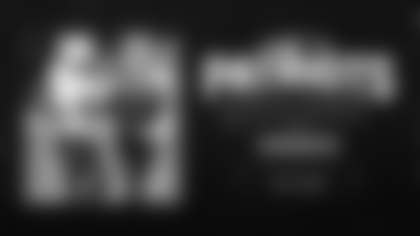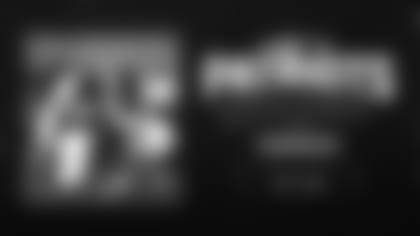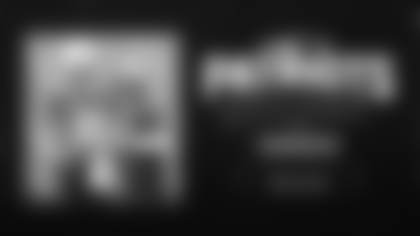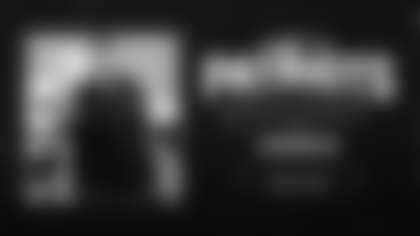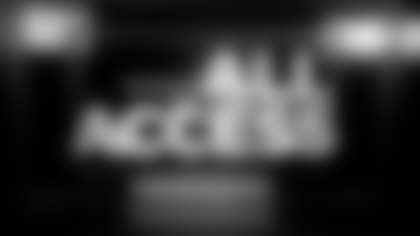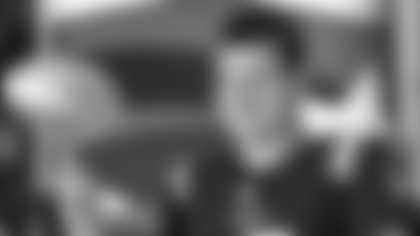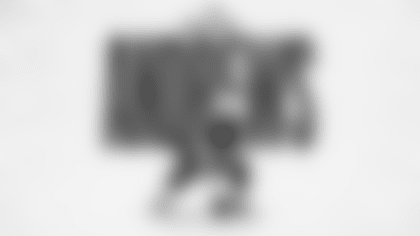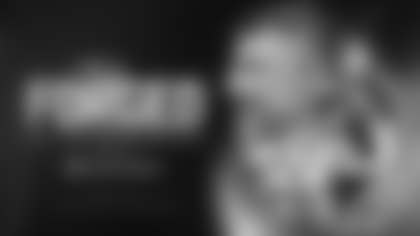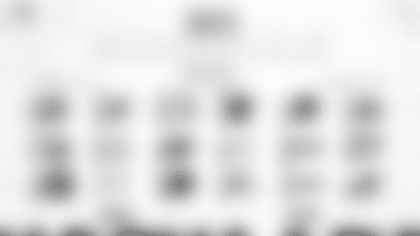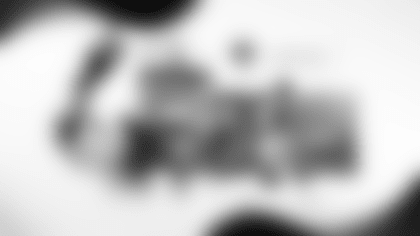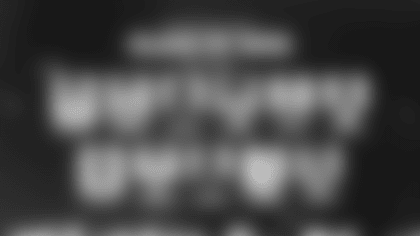NC: Nothing new to report on the roster. We're at 90 so no change there. I know Bill [Belichick] mentioned this after the game last week - this is an important week for us. I mean, this is a good team that we're playing against, a 10 win team from last year - looked pretty impressive in the opener against Kansas City. We're on the road for the first time. This is a young team, I think 74 of their 90 players are 25 years or younger, so this is a young, fast, aggressive, hungry football team that won a lot of games last year and they're off to a good start so far. We'll definitely have our hands full this week. It will be a good test for our team to gauge where we are, handle some elements whether it's the noise, playing on the road, those types of things. We'll have a few more days of preparation here. This is kind of more of a normal, if you will, game or preparation week so we'll kind of treat this as if we normally do so today is actually kind of like a Thursday, tomorrow will be like a Friday, Wednesday will be like a Saturday. We'll go through the normal operations and procedures if it were a normal game week and then we'll head down to Tampa and see how it goes.
Q: How much, if at all, has the evaluation process changed for rookies and undrafted free agents since things are kind of compressed?
NC: Really it's no different other than the time period being a little bit shorter. You still can evaluate their performance on a day-to-day basis whether it's individual drills, in a team setting, blitz period, in meetings. You sort of have to get a gauge as to where they are at this point in time because really that's all you have to go off of. The evaluation process hasn't changed. We'll still continue that process of not only evaluating our team but now there are 16 preseason games - or 15, the Jets play Houston tonight - so we're starting that process of evaluating the rest of the league. Other than the time frame being a little more condensed, there's no difference.
Q: For guys like Albert Haynesworth and Sean Ellis, guys who have been in the league for awhile, is the preseason even that important other than getting into shape because don't you know what they are at this point?
NC: I think until a player is actually in your program and in your system, you really don't know until they actually start practicing. It's really no different than kind of what we went through with, let's say Randy [Moss], a few years ago. He came in, didn't really have an offseason and then we went to training camp. So until a player is actually in the program and in your system, with all due respect to how they've played and how they've performed with their other team [and the] rest of the league, it doesn't matter until they're in your system. The most important thing is what they do when they're here and that's what we go off of.
Q: So has it been difficult to evaluate someone like Albert Haynesworth, who hasn't been on the field?
NC: The players that are practicing are out practicing. The players that aren't on the practice field -whenever they get out there, we'll deal with it on a day-to-day basis and when they're on the field we'll evaluate where they are.
Q: Is the clock ticking in terms of them getting out on the field?
NC: I think the clock is ticking on everybody. Everybody has the same opportunity, so the people out on the field have more opportunity. The people who aren't on the field haven't had as much opportunity, so when they actually get out there, we'll see how they do.
Q: Can you judge from an initial practice from when they get out on the field to what they'll be in your system down the road?
NC: I think you have an idea, just sort of a gauge, 'okay, here's what their skill set may be.' But like I mentioned a little bit earlier, until you actually have them under your auspices, you have them under your control a little bit, it's sort of hard to evaluate that. But when they're out there, we'll do the best that we can and the player can only do what he's able to do so we'll deal with it. Every player is kind of at different stages and there's really not much we can do about that.
Q: How do you view the depth on the team this year? Is it any better or worse than previous years?
NC: I think there's depth throughout - number one, we have more players on the roster than we normally do, so there's actually more players that are working because we've gone from 80 to 90. I think there's depth at every position - there's always competition. We always try to create the same amount of competition on a year-to-year basis and let the competition sort of play itself out. The depth comes in a number of different forms. It's how many roles maybe that player - whether it's an offensive player or a defensive player - how many roles, whether it's in the kicking game, defensively. The competition dictates what the player's ultimate role is going to be. We always say it's up to the player to determine what their role is going to be on the team. Our job and the job of the team is to create competition at every position, bring as many good players into your program and whoever the best players are, then those are the players that stick around.
Q: You don't feel any more or less of a need than previous years with the depth you have now?
NC: I don't think we're looking at it any differently than we normally do. We're approaching it the same way.
Q: Looking at other teams' players and free agents, is it busier this summer because of the schedule?
NC: Not necessarily. I think actually once you start the preseason games the same procedures and process that we normally use - we scout every preseason game, not necessarily physically going to see them but we have the tape and our pro scouting staff, we go through game-by game. There's a certain amount of players that you try to earmark in anticipation of who might make that team. At this point it's so early in the ballgame, but at least you get to see those players live for the first time, and sort of can see 'okay, here's what we thought,' whether it's a rookie, 'here's what we thought in the draft and okay, guys maybe only play 15 or 20 plays, but here's what he looks to this point.' In terms of the procedure and the process, we're really not doing anything different than we have in years past. Whether it's workouts, evaluating other teams' personnel, it's the same process we normally go through.
Q: Would you say there is more talent in the free agent pool this year than in years past?
NC: I think because free agency sort of coincided with the beginning of the season, there are a few more players that have a little more experience maybe that are still available. Really, you've taken April and May and everything has fast forwarded to August. So there's 'x' amount of players that are still available for whatever reason. We're no different than any other team - you do your homework and you try to get an idea of who the next best player may be based on whose available and then make a decision whether or not that player fits your club or not.
Q: Could you evaluate your wide receiver group in terms of versatility and what you have at this point?
NC: I think there are guys that have varying degrees of experience. Chad [Ochocinco] hasn't played in our system, so he's sort of getting up to speed but he's been a productive player in this league for a long time and I think things are starting to come together for him a bit more. Wes [Welker], his track record sort of speaks for itself and he's having a really strong camp to this point. Then you have some of the younger players, like the Julian Edelmans, the Taylor Prices, the Brandon Tates, who I'd say [are] different but they're all kind of all [in] a similar stage of development. I think they're all working hard, they're trying to get better, [and] they're trying to make the most of their opportunities when they're on the field. Taylor had a productive evening last [Thursday]. I think the biggest thing is you're looking for the consistency on a day-to-day basis, from one practice to the next, one game to the next, so, 'okay, here's how they played in one particular game - what is it going to look like moving forward?' The most important thing is developing the consistency overall as a player, I think that's the most important thing.
Q: Is there a way to compare two guys in a workout to what you have on the field?
NC: Really, I think you're talking about apples and oranges. Our workout procedure and process - as a matter of fact, I actually went back and checked our notes from last year [and] we've worked out the same amount of players at this time in training camp this year than we have in years past - we're just doing our due diligence; we're doing our homework; we're trying to stay prepared; we're trying to gather as much information as we can on the players and if there's an opportunity that makes sense for us we'll pursue it. I'd say it's standard operating procedure. The guys that are here are working and they're improving - they're trying to get better on a day-to-day basis. We're just trying to evaluate the market to the best of the ability and the as much information at our disposable as possible.
Q: How would you characterize your safety position at this point?
NC: We have a lot of guys that have played a lot of football for us. Patrick [Chung] has played a lot of football for us, Brandon [Meriweather] has been a productive player, Sergio [Brown] has had more opportunities to get on the field here, at least in a practice setting defensively, after last year starting on the practice squad [and] playing a role in the kicking game. Those guys are here, they're working hard, they're improving and they're getting better. They'll have plenty of opportunity when they're on the field but that's a pretty solid group. James Sanders hasn't been out there as much but he's played a lot of football for us. Collectively that's a group - it's not perfect, but I think they're all moving in the right direction.
Q: How would you assess Brandon Meriweather's progress from when you drafted him to now? Do you feel like he's met expectations to this point?
NC: He's a player that had a lot of versatility coming out of Miami. He played some corner, played some safety, actually played a little bit of star. We've tried him in a number of different roles. Brandon has been a productive player since he's been here. He's had production, he's got a lot of experience in our system, he's a talented player. Is it perfect? No. Is he working hard to get better? That's the most important thing. I think the biggest thing is each year is kind of its own entity, so the most important thing is you're just looking for improvement over the course of time and I think Brandon has improved since he's been here and continues to improve and I think all players, regardless of their status, regardless of how much experience they have, there's always an opportunity to improve, and I think that's the most important thing for them to do.
Q: What have you seen out on the practice field that led you to say that Wes Welker has had a real good camp?
NC: He always competes, he always works hard. It looks like his quickness level - he's regained some of that relative to where it was. Wes works hard, he's been a productive player and he just looks confident. He just sort of catches your eye a little bit. He's done some things that look real good.
Q: Is the practice squad still eight from what you've heard?
NC: No change, yeah. Maybe you can talk to somebody in the League and they'll let you know. You probably talk to those guys more than I do.
Q: And roster cut downs, still August 30th?
NC: Right, 75. That's no change. And we'll go to 53 for the final cut.
Q: Were you surprised when Ron Brace was not ready to go at the start of camp? How far is he falling behind?
NC: Really any player that's not out on the field, they're behind the players that are out there practicing. So the sooner a player can get on the field, regardless of who you are, that's the most important thing. When he's on the field, we'll have an opportunity to evaluate him. Of course you'd like to see as many players on the field as you possibly can. When they're not out there, you're not getting the work, you're not getting the opportunities. Whenever that time comes for whomever it is, we'll put them out there and see how they do.
Q: Were you surprised he wasn't out there practicing at the start of camp?
NC: The players that are out there practicing, that's all we're really worried about. The players that can't practice, we can't really worry about that. We're focused on the players that are out there practicing.
Q: When you do these workouts, do you do physicals like you do at the combine?
NC: That's a part of it. There are various aspects to it - that's one aspect of it. Another part is the on-field, you're sort of just getting a gauge as to what they're conditioning level might be. Maybe they're coming off an injury [and] you're just trying to get a gauge as to exactly where they are from a health standpoint.
Q: The star, that's what you call the third corner?
NC: It's the inside position that plays against the slot receiver. So there are a number of different qualities and skills that that that player needs to possess. There are a number of players that will work at the position here during camp, a number of players that actually play that position. I'd say, just looking at Tampa Bay, I would say Ronde Barber is probably one of the better stars that actually plays in the league because of his combination of his blitzing, his instincts, [and] his ball skills. I think he's the only player with 40 interceptions and 20 sacks - I think he's got 26 sacks over his career. So it's a pretty unique skill set. There are a lot of different components that go into it because you have to be able to cover, there's a run-force component of it, being able to cover receivers. Ronde probably does it as good as anybody that's in the league and he's been doing it for a long time.


